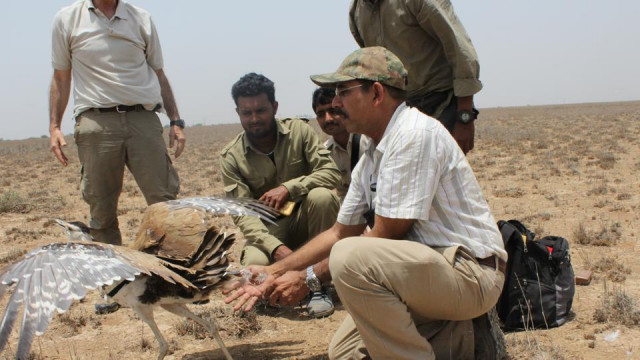India attaches radio-tags on Great Indian Bustard migrating to Pakistan
Move made in bid to track journey to Pakistan – where they suspect birds being hunted

Through the radio-tags the Wildlife Institute of India wants to find out whether windmills and transmission lines in Rajasthan and Gujarat are also responsible for the GIB’s declining numbers. PHOTO: HINDUSTAN TIMES
Using mobile based GPS-chips that transmit data through mobile network and a satellite, the WII aims to record and track GIB’s flight to the neighbouring country. They hope to develop a strategy to save them being hunted. “With scientific evidence in hand, we may need to open diplomatic channels or talk to local NGOs to save the bird in Pakistan,” said YV Jhala, a senior WII scientist overseeing the one-of-a-kind cross-border initiative.
Qatar royal hunting rare houbara bustard attacked in Balochistan
An endangered bird, the bustard is found along the Indo-Pak border in Rajasthan and Gujarat. The GIB migrate to Pakistan’s Sindh province from Kutch in Gujarat and Jaisalmer in Rajasthan. The birds’ population was believed to exceed thousands until a few decades ago, they were found to be below 200 in 2013 - mostly due to a loss of habitat and hunting in Indian states such as Maharashtra, Madhya Pradesh, Gujarat and Rajasthan.
The Indian environment ministry has initiated a habitat improvement programme with its first breeding centre soon to be launched at a park in Jaisalmer. “WII has partnered with Rajasthan forest department and UAE’s International Bustard Breeding Agency , for the conservation breeding centre,” said Jhala. The centre will take around two years to be complete.
Arab Houbara bustard hunters’ convoy attacked in Panjgur
For the GIB, being poached is not the only problem but flying into windmills and transmission lines also adds to their decline. Last week one bird was electrocuted by a power line in Kanoj Village near Jaisalmer.
According to Jhala, “In Rajasthan, apart from the risk of them flying across the border, there’s a risk of them hitting electricity lines near windmills in the desert national park where they are found in large number.” He said the satellite telemetry will help them install bird diverters on power lines. “The bird cannot see the power lines and runs a risk of hitting them,” he added.
This article originally appeared on the Hindustan Times



















COMMENTS
Comments are moderated and generally will be posted if they are on-topic and not abusive.
For more information, please see our Comments FAQ